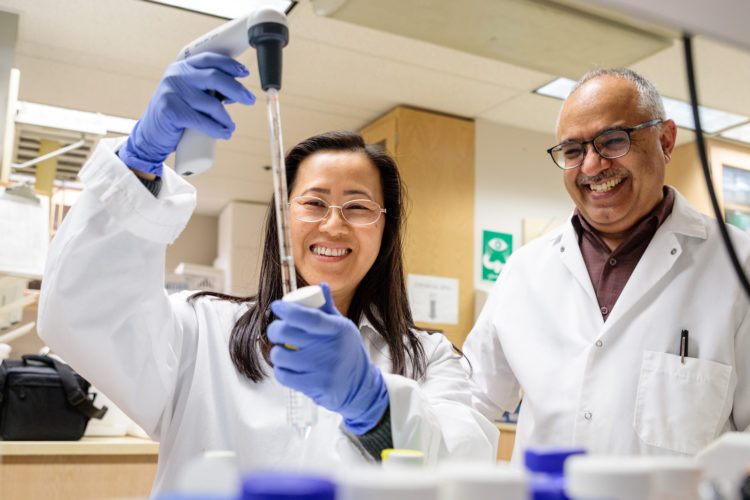
It’s called an experiment for a reason. The secret in science—what world-class researchers know—is that you don’t let the failures stop you. You think of the failures as more data, part of your larger body of work.
For scientists as creative and productive as Jash Unadkat, learning to move past the failures, to learn from them and continue to what’s next, is a key skill that he encourages in his graduate students, post docs, and staff. “We have to pick ourselves up, dust ourselves off, and march on—like a child learning to walk,” he reminds them.
A few years ago he and his lab team thought they had a big break through in a novel approach to treating Alzheimer’s disease. In the brain, there is a key transporter protein (P-glycoprotein) that keeps drugs from getting through the blood brain barrier. “It acts like a bouncer at a nightclub,” said Jash. “It keeps some drugs from getting in, but it also ejects β-amyloid from the brain.” He continued, “We hypothesized a number of years ago that maybe the reason you get Alzheimer’s is due to an accumulation of β-amyloid in brain and they clump and form plaques.”
They thought further that perhaps one of the reasons β-amyloid builds up in the brain is because the “bouncer” P-glycoprotein is compromised, and not able to kick enough of the β-amyloid out of the so-called Brain Club. The team decided to introduce a drug, Rifampin, that increases the amount of P-glycoprotein in the intestine to see if it would do the same in the brain and improve the protein’s ability to remove β-amyloid. To their disappointment they found that Rifampin did not increase the activity level of P-glycoprotein in the brain.
“We were so optimistic that we had a solution that could lead to using an already approved drug in a new way to treat Alzheimer’s disease. Our findings were disappointing, but our work continues with new methods.” —Jash Unadkat, Milo Gibaldi Endowed Professor of Pharmaceutics
Although the team published the research and (then) graduate student Li Liu received a Best Paper Award in DMD, they were now back to square one in the riddle. They knew that drug didn’t work and didn’t know if the lower level of P-glycoprotein was a cause or effect of Alzheimer’s disease. Well, or maybe square two.
Despite that drug not working, it did advance the research and led to an award-winning paper for Anand Deo, one of Jash’s post doc fellows at the time. A few years have passed and the team is taking a new approach with quantitative proteomics o investigate the effect of Alzheimer’s disease on P-glycoprotein levels in the human brain by using liquid chromatography and mass spectrometry and to see if they can measure the difference in P-glycoprotein using this other approach.
They are looking to other proteins that may be important in the process. Proteomics will help by giving insight into the mechanisms in the cells that can change the P-glycoprotein activity levels. There is comfort in the negative results of their initial study. “It means that if someone is taking Rifampin they are not going to increase P-glycoprotein activity in brain, which is particularly important if they are taking a drug for their central nervous system disease, like depression or epilepsy. They know they can safely take the drug because of this study,” said Jash.
To study faculty like Dr. Jash Unadkat, click on the link for more information about our PhD Program in Pharmaceutics.